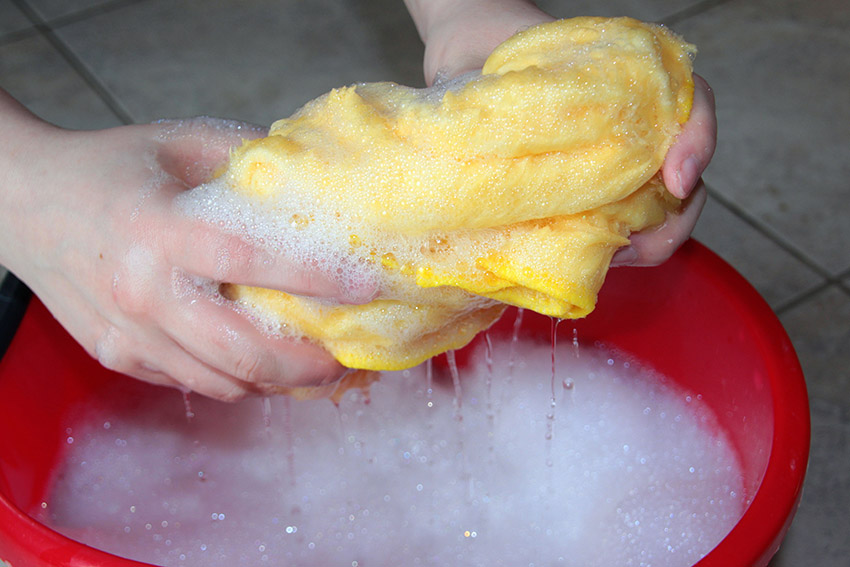Common Household Cleaners You Should Never Mix
The right cleaning products are essential for a healthy home.
Household cleaners are great. You can buy them at the store, you can make your own, or you can use some combination of the two.
But there are some common cleaners you should never mix. Whether you are using store-bought products or whether you want to mix up your own at home, mixing certain cleaning products could hurt you.
It’s tempting sometimes when you’re in hurry, or especially when you have a stubborn mess that just won’t go away, but never mix these household cleaners. In some cases, they won’t be any more effective. In other cases, they can actually cause serious physical harm, ranging from eye and skin irritation to respiratory problems.
Whenever you have any doubt, ALWAYS read and heed the precautions on the label.
This post contains affiliate links, which means I may earn some money if you click on one and make a purchase. It will not cost you any extra, and I will be grateful for your support. Read the full disclosure here.
Tips for Using DIY Cleaners
Before we begin, there are a few universal precautions when creating DIY cleaners.
First, the first time you use a homemade cleaner–no matter who you get your recipe from–mix it in an open bucket in a well-ventilated area (outdoors is probably safest) until you know how the ingredients react with one another.
Wear rubber gloves until you are sure the ingredients will not react adversely with your skin. Even “natural” ingredients can cause skin irritation or allergic reactions. These PVC, latex-free gloves from Wahoo are my personal favorites. They are cotton-lined, so they’re comfy, and super durable.
If you are prone to respiratory issues from cleaning chemicals–even less-toxic ones, wear a mask when you use them (if you can’t talk some other household member into the chores). If these standard N95 masks aren’t enough and you need full respiratory protection, you shouldn’t use these cleaners at all.
And now, the Common Cleaners You Should Never Mix

Bleach & Vinegar
Bleach has long been touted as a great germ killer, and vinegar is often touted as a natural disinfectant, so it seems like together they would be great at keeping your home germ-free, right? WRONG.
When combined, bleach and vinegar create chlorine gas. Even at very low concentrations, chlorine gas can cause burning, watering eyes as well as breathing problems and coughing.
Bleach & Ammonia
Each by itself is a powerful cleaner. Mixed together they create a powerful toxic gas called chloramine. It affects the body much like bleach and vinegar does, but can also cause shortness of breath and chest pain. It’s important to note that many glass cleaners include ammonia, so be mindful not to ever mix bleach with your window cleaner.
And even when used separately, always be sure to use ammonia or bleach in a well-ventilated space as their fumes can cause breathing issues and eye irritation.
Bleach and Hydrogen Peroxide
Do not mix bleach and hydrogen peroxide. While again, both can be effective on their own, when you combine the two, according to Chemical & Engineering News, they “create oxygen gas so violently, it can cause an explosion.” I don’t know about you, but that’s not a risk I want to take.
Bleach & Rubbing Alcohol
I learned something new while researching this article. When you combine bleach and rubbing alcohol (aka Isopropyl alcohol) you create a substance called chloroform. Yes, that chloroform—the stuff bad guys in the movies used to use to knock out their victims. While it may not render you unconscious, it is a toxic irritant and won’t leave you in any shape to finish the housework.
Are you seeing a theme here? Bleach is a useful and versatile cleaning agent in the right circumstances. But it’s a cleaner you should NEVER mix with any other cleaning agents or chemicals. The only thing you should ever mix your bleach with is water. Bleach is a cleaner that should never be mixed with any other chemical or cleaning product.

Vinegar & Baking Soda
This is a particularly popular “natural” cleaning combo. It’s also particularly ineffective. Vinegar is an acid and baking soda is a base and when you combine them, they cancel each other out. Using them together won’t necessarily hurt you, but they should never be mixed in a closed container as the mixture becomes explosive (think elementary school volcano project).
While the potent fizz combining these two products creates may seem like it’s working hard, once the fizzing stops you basically have salt water. In some cases, the combination loosens gunk, but not to the degree social media suggests.
Most of the time you get better results when you use these two ingredients sequentially. For example, add baking soda to a wash load to help boost the effectiveness of your detergent and gain some deodorizing benefits. Follow that with white vinegar instead fabric softener in your fabric softener dispenser to help kill any remaining bacteria and give you a more effective fabric softener (at least in my many years of laundry experience).
I also use vinegar to cut the soap scum in my bathtub. And then I follow up by scrubbing the tub with a paste made of water and baking soda. I’ve found it much more effective than trying to combine the two.
Vinegar & Hydrogen Peroxide
This is a cleaning combo often used by those who want to create more natural cleaners. And while you can use them together—such as misting your counters or cleaning your fruits with alternating doses of vinegar or peroxide and cleaning between each application, you should never mix them in a container together. This creates a substance called peracetic acid, which is toxic and can cause eye and skin irritation and respiratory distress.
Be cautious in combining vinegar, a weak acid, with other cleaning products. While vinegar is not as toxic as bleach can be, it still can create irritating fumes and other byproducts. I use vinegar for cleaning all the time. It’s probably my favorite single-ingredient cleaner and I use it all over my house. Don’t use it on your stone countertops or tile though. It can etch them.
I have learned over time that vinegar, while effective and less harsh than other things can still cause you discomfort. If you’re going to clean with vinegar make sure your area is well-ventilated and use eye protection if you’re sensitive.
For the record, I use baking soda a lot too. It’s a great mild abrasive for scrubbing and loosening stubborn stains. I just rarely combine them.
And finally,
Drain Cleaner & Drain Cleaner
There is little more annoying than a clogged sink. So, when you pour in a bottle of drain cleaner and it doesn’t work, it’s certainly tempting to crack open a different brand of drain cleaner and see if that one works any better. Don’t do it.
Drain cleaners include some pretty heavy duty chemicals and combining them could cause more than just a little eye or skin irritation. The combinations could cause breathing problems or even an explosion. If drain cleaner doesn’t work, you may have to break out the snake (personally, this is my first choice for a clogged drain) or call a plumber.

Be Wise Before Combining Cleaners–If in Doubt, Don’t Do It
This is by no means an exhaustive list of common cleaners you should never mix–but these are the ingredients I most often see in social media posts about making your own “safe” cleaners at home. These may be more economical and (dubiously) less noxious alternatives but it doesn’t mean they are without risk. Be a wise cleaner. Always read the cautionary labels before conducting your home chemistry experiments combining cleaners. There are just some common cleaners that you should never mix with others.
I haven’t included any homemade laundry detergents here. There are enough “recipes” out there that laundry soap would merit a post of its own. However, I’ve tried a few, and they didn’t impress me enough to switch from my commercial cleaners, so I’ll leave that post to someone else.
Have you had any experiences with homemade cleaners that weren’t what you expected? Please share your thoughts, questions, wisdom and experiences in the comment section below.




